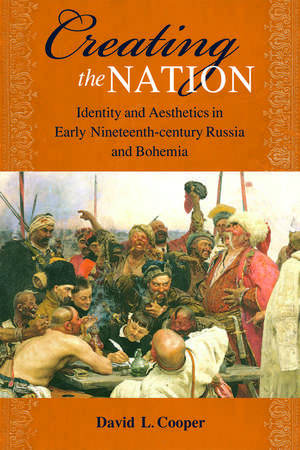Creating the Nation: Identity and Aesthetics in Early Nineteenth-century: NIU Series in Slavic, East European, and Eurasian Studies
Autor David L. Cooperen Limba Engleză Hardback – 14 mai 2010
Offering an incisive new study of literature and nationalism, Cooper examines fundamental developments in Russian and Czech literature and criticism from 1800 to 1830, a period that has largely been neglected in the English-language scholarship. While other books have focused on the question of why developing nations look to literature as a source of national identity, Cooper asks why ideas of nationality were necessary for critics and writers seeking to evolve new genres and forms and modernize literary values. Cooper’s ambitious work produces a clear picture of the paradigm shift in literary values that drove the development of national identity and demonstrates how critical this period is to understanding the major trends and concerns of Russian and Czech literatures over the 19th century.
With its broad scope, this groundbreaking comparison of two national literatures will interest a wide range of scholars and students of cultural and intellectual history and those who study the interaction between nationalism and literature. Creating the Nation will appeal to historians and historically minded political scientists and sociologists, along with specialists in Russian and Czech literatures.
Din seria NIU Series in Slavic, East European, and Eurasian Studies
-
 Preț: 138.18 lei
Preț: 138.18 lei -
 Preț: 89.68 lei
Preț: 89.68 lei -
 Preț: 197.11 lei
Preț: 197.11 lei -
 Preț: 185.88 lei
Preț: 185.88 lei -
 Preț: 239.52 lei
Preț: 239.52 lei -
 Preț: 214.65 lei
Preț: 214.65 lei - 19%
 Preț: 369.08 lei
Preț: 369.08 lei -
 Preț: 130.71 lei
Preț: 130.71 lei -
 Preț: 216.21 lei
Preț: 216.21 lei -
 Preț: 219.33 lei
Preț: 219.33 lei -
 Preț: 114.05 lei
Preț: 114.05 lei -
 Preț: 238.40 lei
Preț: 238.40 lei -
 Preț: 169.95 lei
Preț: 169.95 lei -
 Preț: 216.01 lei
Preț: 216.01 lei -
 Preț: 205.71 lei
Preț: 205.71 lei -
 Preț: 351.49 lei
Preț: 351.49 lei -
 Preț: 153.39 lei
Preț: 153.39 lei -
 Preț: 185.82 lei
Preț: 185.82 lei -
 Preț: 127.66 lei
Preț: 127.66 lei -
 Preț: 200.18 lei
Preț: 200.18 lei -
 Preț: 131.46 lei
Preț: 131.46 lei -
 Preț: 285.24 lei
Preț: 285.24 lei -
 Preț: 191.59 lei
Preț: 191.59 lei -
 Preț: 175.99 lei
Preț: 175.99 lei -
 Preț: 179.03 lei
Preț: 179.03 lei -
 Preț: 215.94 lei
Preț: 215.94 lei -
 Preț: 150.97 lei
Preț: 150.97 lei -
 Preț: 177.43 lei
Preț: 177.43 lei -
 Preț: 255.55 lei
Preț: 255.55 lei -
 Preț: 185.25 lei
Preț: 185.25 lei -
 Preț: 255.62 lei
Preț: 255.62 lei -
 Preț: 283.86 lei
Preț: 283.86 lei -
 Preț: 136.13 lei
Preț: 136.13 lei -
 Preț: 190.06 lei
Preț: 190.06 lei -
 Preț: 131.39 lei
Preț: 131.39 lei -
 Preț: 201.03 lei
Preț: 201.03 lei -
 Preț: 108.71 lei
Preț: 108.71 lei -
 Preț: 191.37 lei
Preț: 191.37 lei -
 Preț: 136.13 lei
Preț: 136.13 lei -
 Preț: 178.19 lei
Preț: 178.19 lei -
 Preț: 118.20 lei
Preț: 118.20 lei -
 Preț: 261.47 lei
Preț: 261.47 lei -
 Preț: 162.55 lei
Preț: 162.55 lei -
 Preț: 223.70 lei
Preț: 223.70 lei -
 Preț: 270.19 lei
Preț: 270.19 lei -
 Preț: 158.38 lei
Preț: 158.38 lei
Preț: 395.30 lei
Nou
Puncte Express: 593
Preț estimativ în valută:
75.64€ • 82.42$ • 63.74£
75.64€ • 82.42$ • 63.74£
Carte tipărită la comandă
Livrare economică 23 aprilie-07 mai
Preluare comenzi: 021 569.72.76
Specificații
ISBN-13: 9780875804200
ISBN-10: 0875804209
Pagini: 300
Ilustrații: 5
Dimensiuni: 152 x 229 x 28 mm
Greutate: 0.68 kg
Ediția:1
Editura: Northern Illinois University Press
Colecția Northern Illinois University Press
Seria NIU Series in Slavic, East European, and Eurasian Studies
ISBN-10: 0875804209
Pagini: 300
Ilustrații: 5
Dimensiuni: 152 x 229 x 28 mm
Greutate: 0.68 kg
Ediția:1
Editura: Northern Illinois University Press
Colecția Northern Illinois University Press
Seria NIU Series in Slavic, East European, and Eurasian Studies
Recenzii
“Brilliant in its understated theoretical approach, stunning in its scope and erudition, and perfect in its stylistic register. The notion of combining the study of Russian and Czech movements toward literary and national modernization, which on the surface might seem forced, proves to be a masterful stroke.”—Sarah Pratt, University of Southern California
Notă biografică
David L. Cooper is Assistant Professor in the Department of Slavic Languages and Literatures at the University of Illinois at Urbana-Champaign.
Descriere
Offering an incisive new study of literature and nationalism, Cooper examines fundamental developments in Russian and Czech literature and criticism from 1800 to 1830, a period that has largely been neglected in the English-language scholarship. While other books have focused on the question of why developing nations look to literature as a source of national identity, Cooper asks why ideas of nationality were necessary for critics and writers seeking to evolve new genres and forms and modernize literary values. Cooper’s ambitious work produces a clear picture of the paradigm shift in literary values that drove the development of national identity and demonstrates how critical this period is to understanding the major trends and concerns of Russian and Czech literatures over the 19th century.
With its broad scope, this groundbreaking comparison of two national literatures will interest a wide range of scholars and students of cultural and intellectual history and those who study the interaction between nationalism and literature. Creating the Nation will appeal to historians and historically minded political scientists and sociologists, along with specialists in Russian and Czech literatures.
